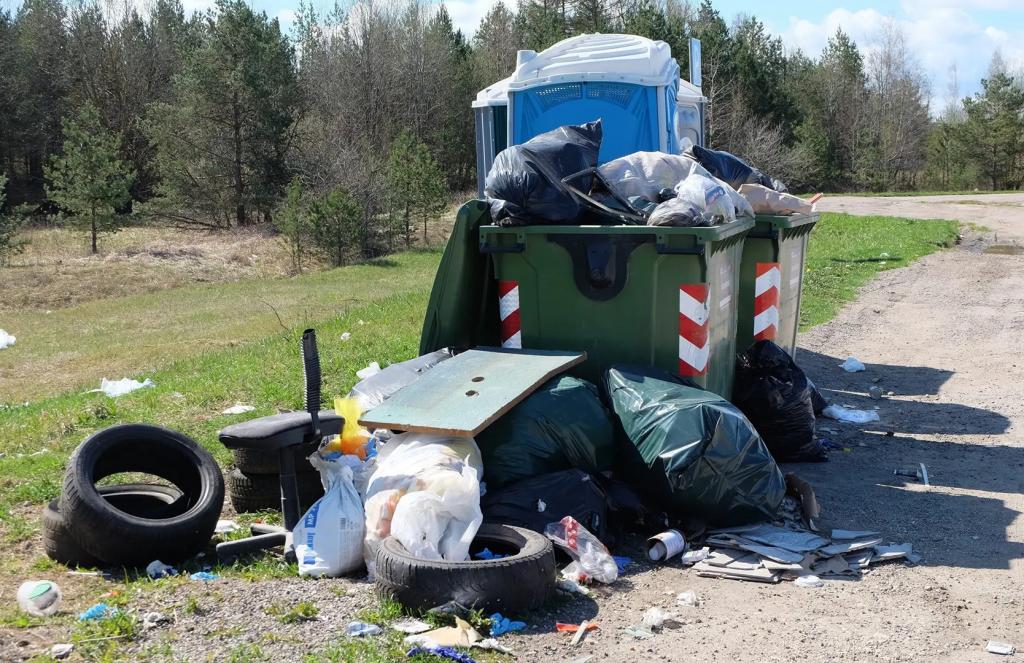Thessaloniki gets ready for its metro launch in November
The underground rapid transit lines have been under construction for almost two decades due to various project delays
 TheMayor.EU logo
TheMayor.EU logo 
With the new monitoring system in place, such eyesores will become a thing of the past , Source: Estonian Road Administration
The Baltic state is set on becoming the world’s first with a fully digital waste management monitoring system
The Estonian Ministry of the Environment has unveiled plans to digitize the national waste management system so as to fully trace collection and transportation in real time. Estonia’s ambition is to become the first country in the world with a fully digital real-time monitoring system for waste management, Undersecretary of the Ministry Kaupo Heinma told ERR.
The planned system will help assess the garbage sorting behaviour of residents and dispel fears that their carefully sorted waste is not being transported to the right place. The collected data will enable the creation of new business models of waste management, allowing companies to better plan their own activities.
As data will be received in real time, it will be possible to quickly pinpoint the problem and then fix it without delay. The new system will also ensure more transparency.
"When a garbage truck arrives, the movement of waste will be automatically sent to the system, similar to a courier's movement with a parcel - what went where and when. Similar to how the Marine Traffic app can track the movement of ships and Flight Radar the flights of aircraft. The aim is to digitize the waste movement as a whole," Heinma said.
The Undersecretary expected the sector to be receptive to the idea, as the government has the will to put it in practice. Estonia's goal is to recycle 55 percent of municipal waste by 2025, Heinma recalled, adding that he hoped the waste management system will be digitized by then. The first step is to attach GPS trackers to garbage trucks to see exactly how much refuse is collected and where it is taken to, he explained.
Funding for the system will surely come from the European Union, as EUR 110 million has already been earmarked for bolstering the circular economy and its digitization in the 2021-2027 budget period.
"I would like to do as much as possible as soon as possible. We will not only make changes to the law with new, stricter requirements, but we will also make a turnaround in green management," Heinma emphasized.
The plans will also clearly define what should be done by national and local governments. People's recycling habits could also be monitored and the “carrot and stick” approach could be used to make them do their best.
"These solutions exist individually in other countries. But Estonia can make this big change because Estonia is so small. It would add a lot to the transparency of waste management and show that it is not a dark place where no one knows what is going on," Heinma said.
Meanwhile, the Ministry of the Environment is proposing a completely new sorting regulation in the debated new waste draft legislation, which is set to change the basic principles of waste lifecycle organization.
This change removes waste sorting from the end of the chain, because it is resource-intensive and inefficient. The lifecycle of waste will begin with the individual, who has generated the waste and who will now be responsible for sorting garbage by type and handing it over to waste managers. This will increase the amount of re-usable waste and will save energy and workforce to be used at a possible later stage of sorting.

The underground rapid transit lines have been under construction for almost two decades due to various project delays

Now you can get your wine in Talence by paying directly in Bitcoin

That’s because the state has to spend money on updating the railway infrastructure rather than subsidizing the cost of the popular pass

Rethinking renewable energy sources for the urban landscape

The examples, compiled by Beyond Fossil Fuels, can inform and inspire communities and entrepreneurs that still feel trepidation at the prospect of energy transition

Now you can get your wine in Talence by paying directly in Bitcoin

The 10th European Conference on Sustainable Cities and Towns (ESCT) sets the stage for stronger cooperation between the EU, national and local level to fast track Europe's transition to climate neutrality.

At least, that’s the promise made by the mayor of Paris, Anne Hidalgo

The underground rapid transit lines have been under construction for almost two decades due to various project delays

At least, that’s the promise made by the mayor of Paris, Anne Hidalgo

Hostal de Pinós is located in the geographical centre of the autonomous region

Despite its church-y name, the district has long been known as the hangout spot for the artsy crowds

Urban dwellers across the EU are having a say in making their surroundings friendlier to people and the environment.

Forests in the EU can help green the European construction industry and bolster a continent-wide push for architectural improvements.

Apply by 10 November and do your part for the transformation of European public spaces

An interview with the Mayor of a Polish city that seeks to reinvent itself

An interview with the newly elected ICLEI President and Mayor of Malmö

A conversation with the Mayor of Lisbon about the spirit and dimensions of innovation present in the Portuguese capital














